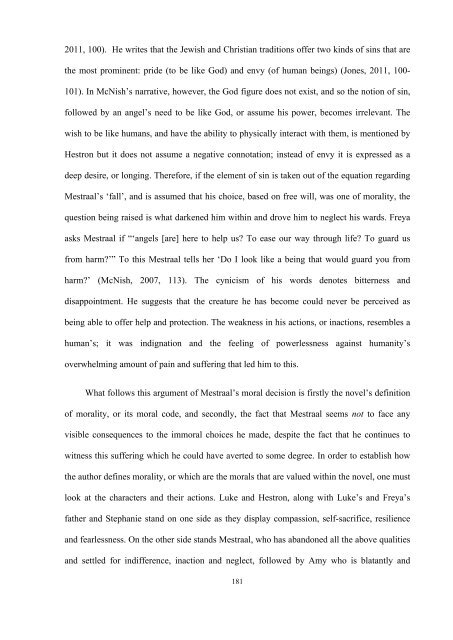The secular angel in contemporary children's literature: David ...
The secular angel in contemporary children's literature: David ...
The secular angel in contemporary children's literature: David ...
Create successful ePaper yourself
Turn your PDF publications into a flip-book with our unique Google optimized e-Paper software.
2011, 100). He writes that the Jewish and Christian traditions offer two k<strong>in</strong>ds of s<strong>in</strong>s that are<br />
the most prom<strong>in</strong>ent: pride (to be like God) and envy (of human be<strong>in</strong>gs) (Jones, 2011, 100-<br />
101). In McNish’s narrative, however, the God figure does not exist, and so the notion of s<strong>in</strong>,<br />
followed by an <strong>angel</strong>’s need to be like God, or assume his power, becomes irrelevant. <strong>The</strong><br />
wish to be like humans, and have the ability to physically <strong>in</strong>teract with them, is mentioned by<br />
Hestron but it does not assume a negative connotation; <strong>in</strong>stead of envy it is expressed as a<br />
deep desire, or long<strong>in</strong>g. <strong>The</strong>refore, if the element of s<strong>in</strong> is taken out of the equation regard<strong>in</strong>g<br />
Mestraal’s ‘fall’, and is assumed that his choice, based on free will, was one of morality, the<br />
question be<strong>in</strong>g raised is what darkened him with<strong>in</strong> and drove him to neglect his wards. Freya<br />
asks Mestraal if “‘<strong>angel</strong>s [are] here to help us? To ease our way through life? To guard us<br />
from harm?’” To this Mestraal tells her ‘Do I look like a be<strong>in</strong>g that would guard you from<br />
harm?’ (McNish, 2007, 113). <strong>The</strong> cynicism of his words denotes bitterness and<br />
disappo<strong>in</strong>tment. He suggests that the creature he has become could never be perceived as<br />
be<strong>in</strong>g able to offer help and protection. <strong>The</strong> weakness <strong>in</strong> his actions, or <strong>in</strong>actions, resembles a<br />
human’s; it was <strong>in</strong>dignation and the feel<strong>in</strong>g of powerlessness aga<strong>in</strong>st humanity’s<br />
overwhelm<strong>in</strong>g amount of pa<strong>in</strong> and suffer<strong>in</strong>g that led him to this.<br />
What follows this argument of Mestraal’s moral decision is firstly the novel’s def<strong>in</strong>ition<br />
of morality, or its moral code, and secondly, the fact that Mestraal seems not to face any<br />
visible consequences to the immoral choices he made, despite the fact that he cont<strong>in</strong>ues to<br />
witness this suffer<strong>in</strong>g which he could have averted to some degree. In order to establish how<br />
the author def<strong>in</strong>es morality, or which are the morals that are valued with<strong>in</strong> the novel, one must<br />
look at the characters and their actions. Luke and Hestron, along with Luke’s and Freya’s<br />
father and Stephanie stand on one side as they display compassion, self-sacrifice, resilience<br />
and fearlessness. On the other side stands Mestraal, who has abandoned all the above qualities<br />
and settled for <strong>in</strong>difference, <strong>in</strong>action and neglect, followed by Amy who is blatantly and<br />
181
















